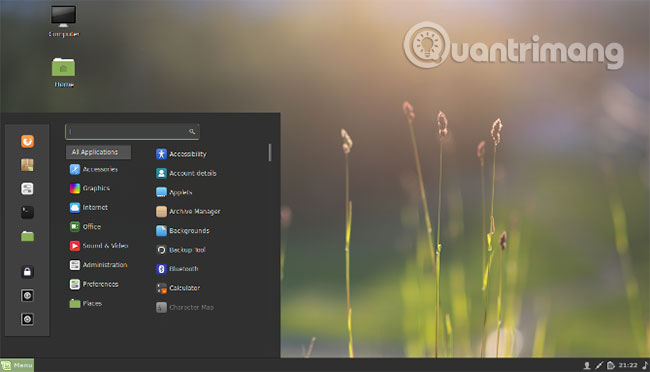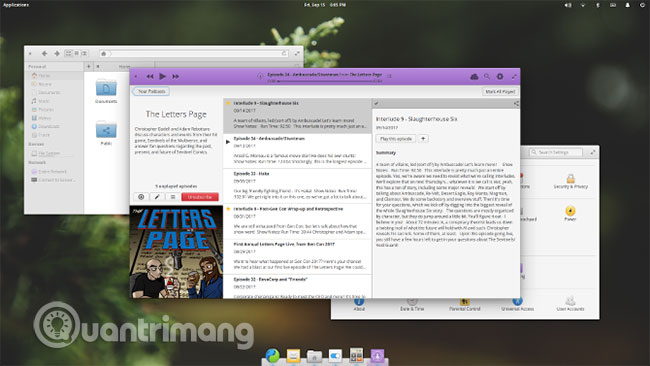The difference between Ubuntu and Ubuntu-based distributions
Linux Mint and elementary OS are all popular alternatives to Ubuntu, but they are also based on Ubuntu. If you're new to Linux, this can be confusing.Join TipsMake.com to learn the difference between Ubuntu and Ubuntu-based distributions, as well as why it's important.
What is the difference between Ubuntu and Ubuntu-based distributions?
- Ubuntu Desktop
- Is Ubuntu and Linux the same?
- Ubuntu infrastructure
- What is Ubuntu based on?
- Ubuntu ecosystem
- The distribution is based on Ubuntu
- What does that mean?
- Should I use an Ubuntu-based distro?
Ubuntu Desktop

Ubuntu is a free, open-source alternative to proprietary, commercial operating systems like Windows and macOS. There is an on-board control panel that shows the time, system indicator and how to open the overview screen or dashboard, allowing you to access your applications. There you can also switch between virtual windows and windows.
There is a company behind Ubuntu called Canonical. Unlike Microsoft and Apple, Canonical almost does not create any elements for its operating system. Instead, Ubuntu is made up of free, open-source components from individuals and groups around the world.
The interface in the image above is not unique to Ubuntu. It's a desktop environment called GNOME.
Canonical uses these components to create a desktop experience that anyone can download for free. You can use Ubuntu for general computers, office work, software development and gaming. You can also use Ubuntu to run servers.
Is Ubuntu and Linux the same?
Not necessarily. The kernel is a factor that allows software to communicate with computer hardware. The Linux kernel is just one of many components that Canonical uses to create Ubuntu desktops.
The difference between Ubuntu and Linux is that you can't really run the Linux kernel yourself. The Linux kernel runs in the background, providing power to various devices in life, from fuel pump systems at gas stations to Android smartphones. Linux desktops favor free and open source software. Thus, it would be more accurate to consider Ubuntu as part of Linux, not two separate things.
Ubuntu infrastructure

Ubuntu is much larger than the desktop you download from ubuntu.com. This is a community of developers and users. It is also a collection of applications, as well as programs that are collected from many sources and used in many different ways.
Most of the power supply code for Ubuntu does not come from Canonical.
What is Ubuntu based on?
Ubuntu is based on Debian, a large project that does the same thing Ubuntu is doing, but in a more difficult way. To clarify things, we will have to build some terms:
- Package (Package): How developers distribute software to Linux. Applications, system components, drivers, codecs and other software are available in package form.
- Package Format : Different versions of Linux organize packages that use different formats. So far, there is no single format compatible with all Linux versions.
- Repository : Instead of downloading the installer from a website, Linux software is often found in the repository. Repository is a large collection of packages that you can access and download when needed. Linux application stores provide software in a way that is similar to Android and iOS, while more traditional tools are called package managers.
- Distribution : Distribution is a set of software that is packaged, helps the operating system operate, along with associated communities and repositories.
Ubuntu and Debian are all Linux distributions. Ubuntu uses the DEB package format like Debian, although the software is not always compatible between the two software. Ubuntu provides its own repository, but mostly contains packages from Debian.
Ubuntu ecosystem

Ubuntu comes in many forms. The default desktop uses the GNOME environment. There are also many other desktop environments. For example, Kubuntu uses KDE Plasma desktop. Xubuntu uses another interface called Xfce.
Canonical does not work on these variants, but it stores them and all their software, using repositories similar to the default Ubuntu desktop.
The distribution is based on Ubuntu
There are many Ubuntu-based distributions that Canonical doesn't have any relationship with (similar to the way Ubuntu is based on Debian). Linux Mint and elementary OS are the two most popular examples. Both come from different development groups and bring their own unique experiences. One major difference between Ubuntu and Linux Mint is that Linux Mint has a more Windows-like interface.
Linux Mint's infrastructure is like Ubuntu. Similarly, when you open an app store on Linux Mint and elementary OS, most software is the same as what you will get on Ubuntu.
What does that mean?
That means that when you see a program that mentions Ubuntu support, that support is not limited to the Ubuntu desktop. The software will also run on 'child' versions of Ubuntu and unrelated projects, sharing basic Ubuntu infrastructure. Steam said it works on Ubuntu, but you can run the same installer on Pop! _OS (another Ubuntu-based distribution).
If you choose to install elementary OS instead of Ubuntu, you need to know that most of what applies to Ubuntu also applies to elementary OS. If Ubuntu doesn't work on your computer, so does elementary OS. Similarly, if the game controller is not compatible with Ubuntu, it is most likely not compatible with the system running your elementary OS. When an error occurs, you can find more solutions related to Ubuntu than elementary OS.

In contrast, Ubuntu cannot easily run software designed specifically for elementary OS. To explain this relationship, the Linux community uses a metaphor for a stream. Ubuntu is upstream of elementary OS. Software running down from Ubuntu is like a water flow in only one direction.
The more things you get from the source, the more chances you have to encounter errors. Debian takes source code for programs and bundles them into DEBs. Ubuntu restructures these packages, and then some distributions introduce their own tweaks, then elementary OS then adds a few changes. When a problem occurs, you will need to consider many points on the chain. Will the problem be in the original source code, Debian, Ubuntu or elementary OS?
Should I use an Ubuntu-based distro?
That depends on your needs and expectations. Here are some questions to consider:
- Are you satisfied with Ubuntu? If you are happy with the default Ubuntu desktop, keep what you have.
- Do you like Ubuntu but its interface? You can change the desktop environment without reinstalling the distribution. Or you can choose to install another version of Ubuntu.
- Do you like Ubuntu infrastructure but don't like its management? If you have problems with Canonical, using an Ubuntu-based distribution, provided by another community may be helpful. Linux Mint, elementary OS and Pop! _OS uses the Ubuntu infrastructure, but is not affected by Canonical's decisions like other official "child" versions of Ubuntu.
If you don't like the Ubuntu infrastructure, it's best to completely leave this ecosystem. There are many other Linux distributions out there with different strengths and weaknesses. They can completely change your impression of Linux.
Wish you find yourself the right choice!